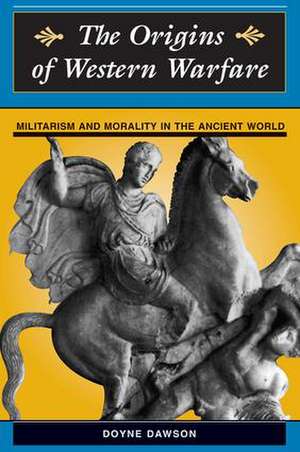The Origins Of Western Warfare: Militarism And Morality In The Ancient World
Autor Doyne Dawson, James D Dawsonen Limba Engleză Paperback – 9 ian 1998
| Toate formatele și edițiile | Preț | Express |
|---|---|---|
| Paperback (1) | 410.83 lei 6-8 săpt. | |
| Taylor & Francis – 9 ian 1998 | 410.83 lei 6-8 săpt. | |
| Hardback (1) | 1000.27 lei 6-8 săpt. | |
| Taylor & Francis – 13 sep 2019 | 1000.27 lei 6-8 săpt. |
Preț: 410.83 lei
Nou
Puncte Express: 616
Preț estimativ în valută:
78.61€ • 82.08$ • 65.06£
78.61€ • 82.08$ • 65.06£
Carte tipărită la comandă
Livrare economică 05-19 aprilie
Preluare comenzi: 021 569.72.76
Specificații
ISBN-13: 9780813333922
ISBN-10: 081333392X
Pagini: 214
Ilustrații: black & white illustrations
Dimensiuni: 152 x 229 x 15 mm
Greutate: 0.33 kg
Ediția:Revised
Editura: Taylor & Francis
Colecția Routledge
Locul publicării:Oxford, United Kingdom
ISBN-10: 081333392X
Pagini: 214
Ilustrații: black & white illustrations
Dimensiuni: 152 x 229 x 15 mm
Greutate: 0.33 kg
Ediția:Revised
Editura: Taylor & Francis
Colecția Routledge
Locul publicării:Oxford, United Kingdom
Cuprins
Introduction -- In the Beginning -- Primitive Warfare -- Chiefdoms, States, and Empires -- Greek Warfare -- The Greek Way of War -- The Ethics of Greek Warfare -- The Greeks and Raison d’Etat -- Warfare and the Greek Constitution -- Roman Warfare -- The Roman Way of War -- The Ethics of Roman Warfare -- The Romans and Raison d’ Etat -- Warfare and the Roman Constitution -- The Classical Legacy -- Warfare in Medieval Thought -- Warfare in Renaissance Thought -- Conclusion
Notă biografică
Doyne Dawson received his Ph.D. from Princeton University and is the author of Cities of the Gods: Communist Utopias in Greek Thought. He lives in Greensboro, North Carolina. Doyne Dawson received his Ph.D. from Princeton University and is the author of Cities of the Gods: Communist Utopias in Greek Thought. He lives in Greensboro, North Carolina.
Descriere
This book provides an overview of primitive Western warfare, showing how the main motivations of prehistoric combat—revenge and honor—set the tone for Greek thinking about questions of war and morality. It offers a short account of classical theories of war and imperialism.








